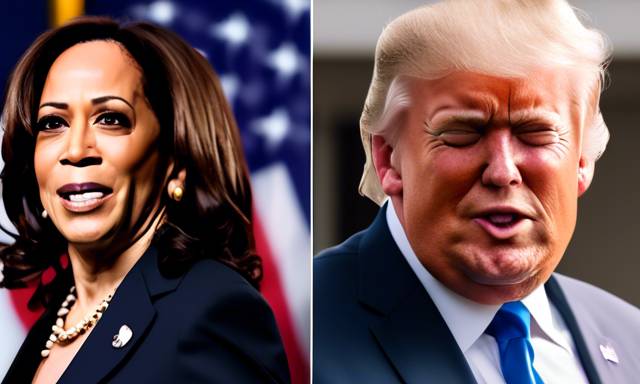Recent Polling Insights on the 2024 Presidential Race 🗳️
According to a recent Bloomberg poll conducted from September 19 to 25, Kamala Harris holds a significant advantage over Donald Trump in several crucial swing states that may determine the outcome of the upcoming 2024 U.S. presidential election. This year, the political landscape in these key territories is shaping up to be quite competitive.
Harris Takes the Lead in Key Swing States 🌟
The survey results indicate that Harris enjoys a favorable position in several battleground states, including:
- Arizona
- Michigan
- Nevada
- North Carolina
- Pennsylvania
- Wisconsin
Each of these states is integral to the electoral map and could potentially swing the election in favor of the candidate who can effectively appeal to voters. However, it is noteworthy that in Georgia, both candidates are currently tied, showing a tightly contested race.
The Election Landscape Intensifies 🔥
The polling data underscores a neck-and-neck contest as Harris and Trump prepare for the November showdown. Initially, following President Joe Biden’s decision to withdraw his candidacy earlier this year, Harris saw a surge in support. However, both candidates have since settled into a competitive dynamic.
Harris on Technology and Digital Innovation 💡
This year, as the political climate evolves, Harris has been vocal about her intentions to foster technological advancements. At a campaign event in Pittsburgh, she expressed her commitment to promoting innovation in digital assets. She stated, “We will invest in biomanufacturing and aerospace, remain dominant in AI and quantum computing, blockchain, and other emerging technologies, and expand our lead in clean energy innovation and manufacturing.”
Moreover, Harris emphasized the need for a balanced approach, promising to create a supportive environment for emerging tech while ensuring consumer protection. Her approach aims to yield clear regulations for the burgeoning sectors, including digital assets.
Divided Opinions in the Crypto Community 💰
Despite her promises to support digital innovation, there is a marked divide within the cryptocurrency community regarding which candidate is preferred. Some community members remain loyal to Trump, who has long been an advocate for cryptocurrency interests.
The Biden administration has faced criticism for its stance towards cryptocurrency, particularly concerning its support of the U.S. Securities and Exchange Commission (SEC) in regulating digital assets. This year, a Fairleigh Dickinson University (FDU) survey revealed that individuals without digital assets lean towards Harris, whereas cryptocurrency holders tend to favor Trump.
Trump’s Crypto Commitment 🔥
In the political arena, Trump has publicly declared his support for cryptocurrencies throughout his campaign. He has consistently called for regulations that would favor the industry rather than hinder it. At a recent Bitcoin conference, Trump noted that while regulations would be necessary, they would be crafted by proponents of the crypto industry rather than its detractors.
Further solidifying his commitment to the cryptocurrency sector, Trump unveiled his family’s new crypto initiative, World Liberty Financial, earlier this month. He issued a stark warning to American entrepreneurs in the crypto space, indicating potential repercussions should he lose the election. He claimed that investigations currently affecting individuals in the cryptocurrency sector would intensify immediately if a different administration took office.
Hot Take: The Road Ahead for Both Candidates 🛣️
As both Kamala Harris and Donald Trump continue to gather support and campaign in the lead-up to the election, the focus on swing states will be critical. The contrasting views on technology and cryptocurrency may play a significant role in shaping voter perceptions. Each candidate’s approach to regulation, innovation, and technological advancement is likely to resonate with different segments of the electorate. This year’s election enters its final phase with high stakes for both candidates, and the unfolding dynamics in the coming weeks will be pivotal for their campaigns.
In a rapidly changing political climate, observing how voters in those pivotal states respond to the candidates’ differing views on innovation and regulation will be crucial in determining the ultimate outcome of the election.





 By
By

 By
By
 By
By
 By
By
 By
By